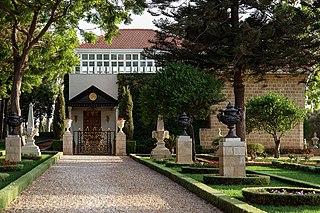Adelbert Mühlschlegel (June 16, 1897 – July 29, 1980) [1] was a prominent German Bahá'í from a Protestant family. He became a Bahá'í in 1920, translated Bahá'í literature and served as a member of the National Spiritual Assembly of Germany.

Though mentioned in the Bahá'í literature in the 19th century, the Bahá'í Faith in Germany begins in the early 20th century when two emigrants to the United States returned on prolonged visits to Germany bringing their newfound religion. The first Bahá'í Local Spiritual Assembly was established following the conversion of enough individuals to elect one in 1908. After the visit of `Abdu'l-Bahá, then head of the religion, and the establishing of many further assemblies across Germany despite the difficulties of World War I, elections were called for the first Bahá'í National Spiritual Assembly in 1923. Banned for a time by the National Socialist government and then in East Germany the religion re-organized and was soon given the task of building the first Bahá'í House of Worship for Europe. After German reunification the community multiplied its interests across a wide range of concerns earning the praise of German politicians. German Census data shows 5600 registered Bahá'ís in Germany in 2012. But there might be much more who are not enrolled in the official community. The Association of Religion Data Archives estimated some 11743 Bahá'ís in 2005.
Bahá'í literature, like the literature of many religions, covers a variety of topics and forms, including scripture and inspiration, interpretation, history and biography, introduction and study materials, and apologia. Sometimes considerable overlap between these forms can be observed in a particular text.
Spiritual Assembly is a term given by `Abdu'l-Bahá to refer to elected councils that govern the Bahá'í Faith. Because the Bahá'í Faith has no clergy, they carry out the affairs of the community. In addition to existing at the local level, there are national Spiritual Assemblies.
Contents
He was appointed a Hand of the Cause by Shoghi Effendi in February 1952, individuals who have been considered to have achieved a distinguished rank in service to the religion. He was the first of three believers who decisively influenced the German Bahá'ís. [2] after which he travelled to visit the Bahá'ís in many countries. He died in Athens, Greece.

Shoghí Effendí Rabbání, better known as Shoghi Effendi, was the Guardian and appointed head of the Bahá'í Faith from 1921 until his death in 1957. Shoghi Effendi spent his early life in ʿAkkā (Acre). His education was directed to serving as secretary and translator to his grandfather, `Abdu'l-Bahá, then leader of the Bahá'í Faith and son of the religion's founder, Bahá'u'lláh.

Athens is the capital and largest city of Greece. Athens dominates the Attica region and is one of the world's oldest cities, with its recorded history spanning over 3,400 years and its earliest human presence starting somewhere between the 11th and 7th millennium BC.

Greece, officially the Hellenic Republic, historically also known as Hellas, is a country located in Southern and Southeast Europe, with a population of approximately 11 million as of 2016. Athens is the nation's capital and largest city, followed by Thessaloniki.





